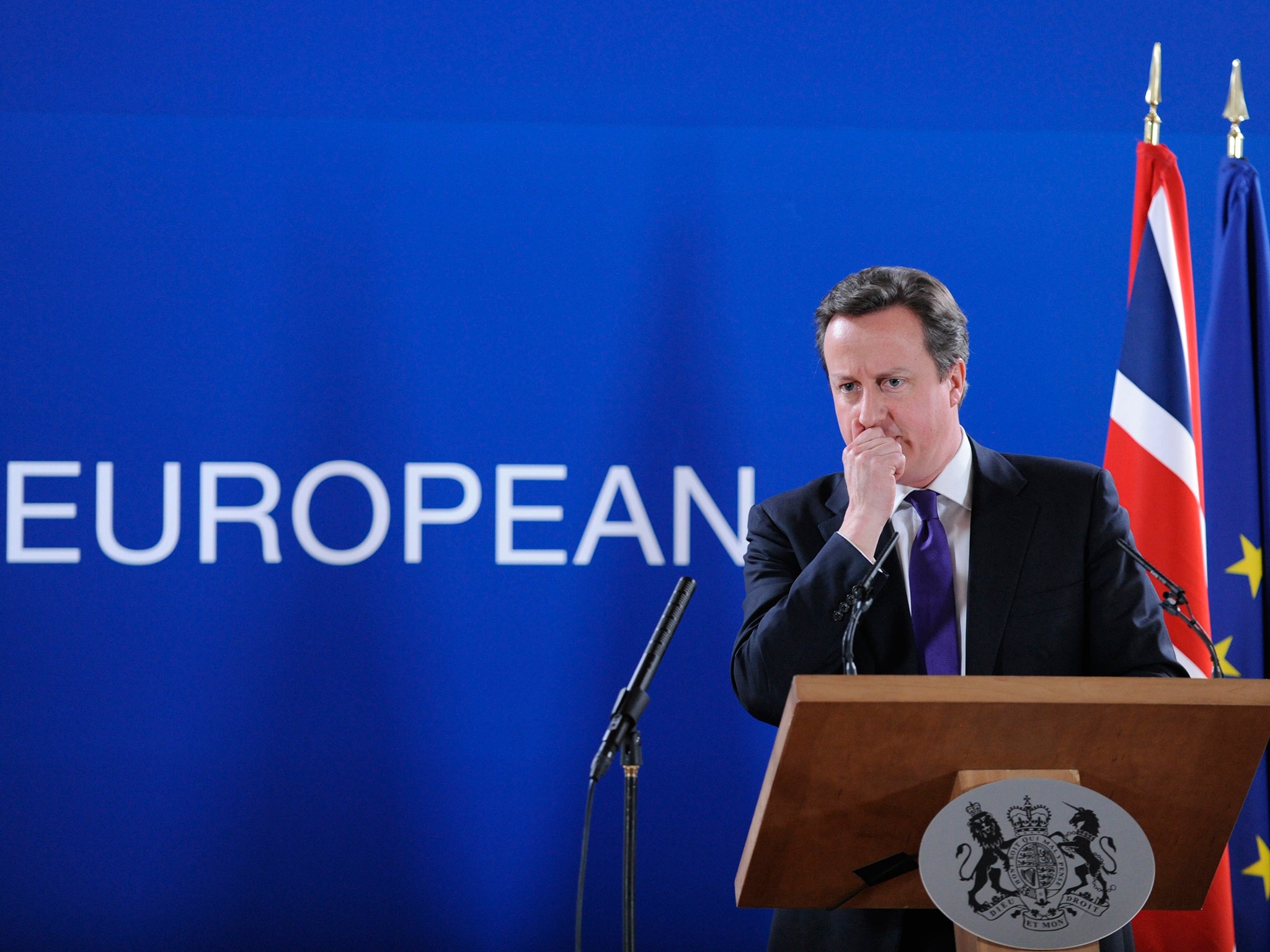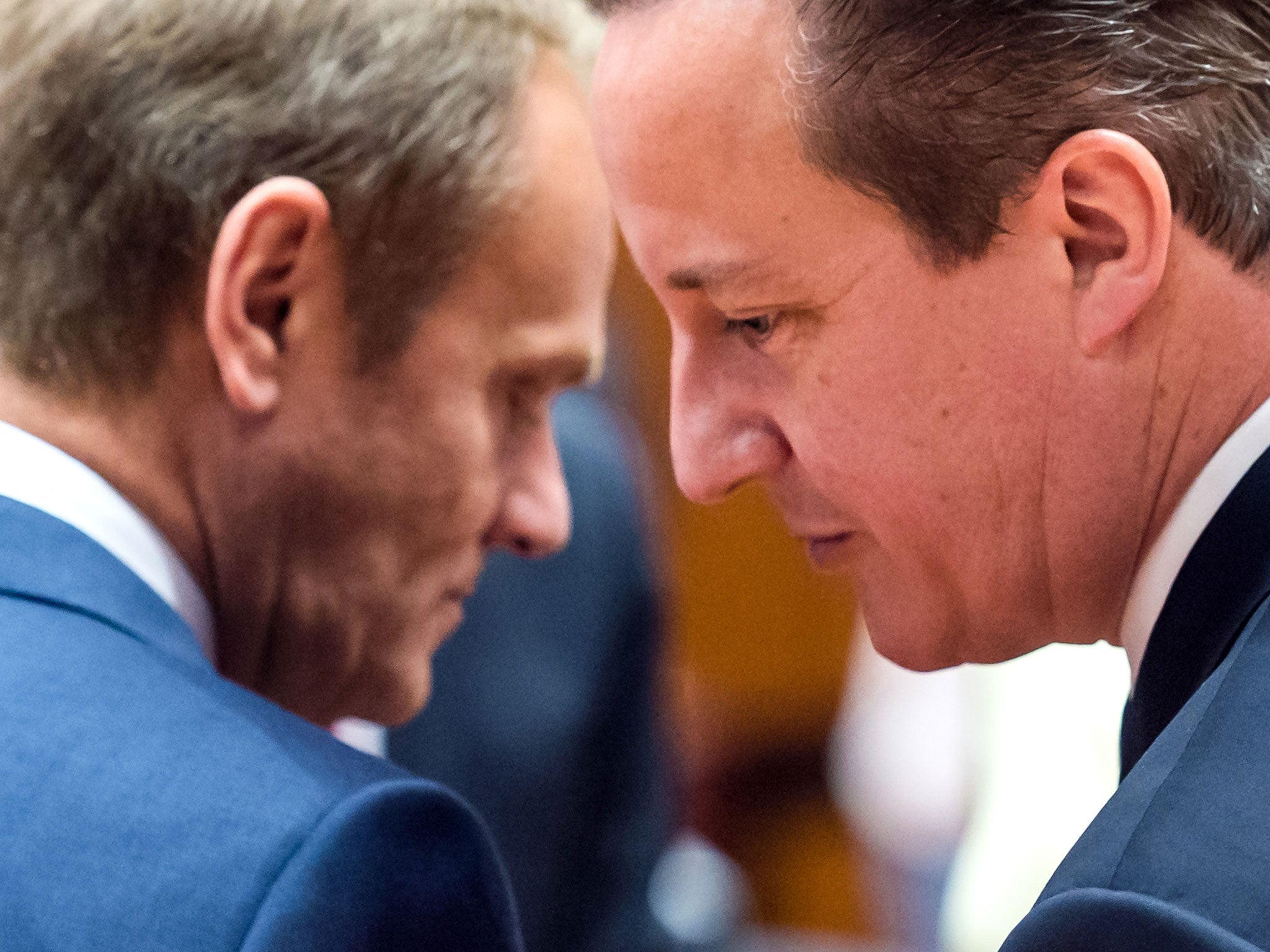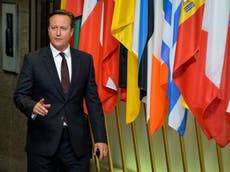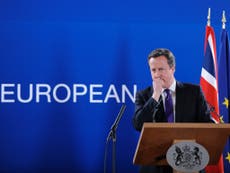David Cameron is keeping his cards close to his chest over Europe – with good reason
Inside Westminster: The referendum could prove the PM's s toughest battle yet


There were wry smiles in several EU capitals when they received the pre-cooked draft conclusions for the summit of European leaders. The final agenda item said simply: “UK [p.m.]”-- showing when David Cameron’s attempt to negotiate new membership terms would be discussed but providing no detail. “The square brackets said everything; where there should be firm proposals, there is a vacuum,” one EU diplomat complained. Despite Mr Cameron’s hyperactive post-election European tour and talks with all other 27 leaders, some EU partners grumble that they do not know what the Prime Minister wants from the Great British Renegotiation.
He is keeping his cards close to his chest with good reason. If he produced a shopping list of reforms, Eurosceptic Conservative MPs would dismiss it as not long or strong enough, while some EU countries would reject it as far too long and strong, seeing it as an opening bid they could whittle down. In this jungle Mr Cameron has chosen to walk through, he can be ambushed at any time by hostile groups on either flank – the Eurosceptics at home and the EU. All the time he must have one eye on a third audience – the British public, who will decide in a referendum whether we remain a member of the 28-strong club.
Mr Cameron will claim victory against the odds at every stage, as he did in Brussels at 3am on Friday morning after EU leaders formally agreed to address “the British question.” But we are only at the start of a long road and Mr Cameron knows it will get bumpy. His message is: ignore the damaging headlines and rows en route, judge me on the final outcome. He draws a parallel with the general election, where the opinion polls and the headlines said one thing and the result was very different.

However, the Great Renegotiation will be different too. He will not enjoy the luxury of a weak and vulnerable Labour Opposition. His enemies at home and abroad show little respect for his election victory. In Europe, Mr Cameron’s belated charm offensive gets mixed reviews. Some leaders welcome his new “softly, softly” approach. Others say he has ground to make up after failing to win many friends and influence people in his first five years as prime minister. Critics remember his lonely, fruitless attempts to block an EU fiscal pact and veto Jean-Claude Juncker's appointment as European Commission President. As one who was recently given the one-to-one Cameron treatment put it: “I am not going to help someone who does not understand Europe.”
The suspicion among some other leaders is that Mr Cameron is appeasing rather than taking on his troublesome backbenchers. They want to see him make a positive case for Europe, and come up with reforms that help the EU rather than give the UK special treatment. They would rather Britain remain in the club but there are limits to how far they will go to make that happen.
At home, hardline Tory Eurosceptic MPs, who number between 20 and 50, would vote Out in the referendum even if Mr Cameron miraculously won a deal giving Britain £10bn a year from the EU forever instead of us paying in that amount. Their minds are made up. His strategy is to limit the number in the hardline camp, by winning over a bigger group of Eurosceptic MPs who will judge his new deal on its merits.
It has been a messy start. Mr Cameron has already broken his golden rule: while being vague about most of his demands, he proposed a four-wait before new EU migrants can draw state benefits and tax credits. The terse response in Brussels is: “no chance,” as one senior figure told me yesterday. Such a move would be illegal under EU law as it would “discriminate” against one group of people. In theory, Britain could win a change to the EU’s governing treaty but Brussels insiders say there is no prospect of 27 other nations signing up to such a draconian curb on their own workers.
There is already speculation in Brussels that Mr Cameron will end up imposing a British-only delay on migrants’ benefits to avoid a humiliating climbdown that would be seized on by the Out campaign. Such restrictions would almost certainly be overturned by the European Court of Justice, which upholds EU rules, but the legal process could take three to five years –and would not be concluded until well after the UK referendum, when the curbs would be in place.
However, the prospect of them being ruled illegal would allow the Out camp to warn that the UK’s new agreement was not worth the paper it was written on. The anti-EU brigade is convinced that Mr Cameron will find it hard to “do a Wilson”-- the Labour Prime Minister Harold Wilson , who won an In vote in the 1975 referendum after claiming that a tiny tweak to Britain’s EU entry terms amounted to a renegotiation. “People are much more sceptical about politicians today; they don't trust them,”said one No camp organiser.
His unexpected election triumph shows that we should not underestimate Mr Cameron. Yet some natural allies in the In crowd worry that he is in too much of a hurry to hold the referendum next year so he can stop “banging on about Europe.” They fear a rushed job will produce a very limited package of reforms that would increase the prospects of Britons voting Out. This referendum could prove Mr Cameron’s toughest battle yet.




Join our commenting forum
Join thought-provoking conversations, follow other Independent readers and see their replies